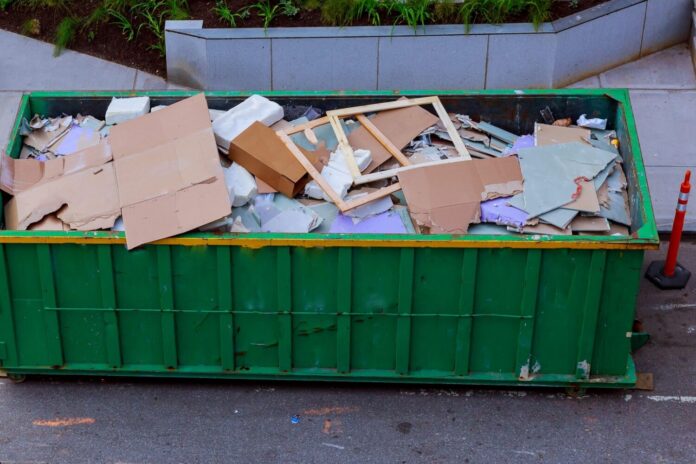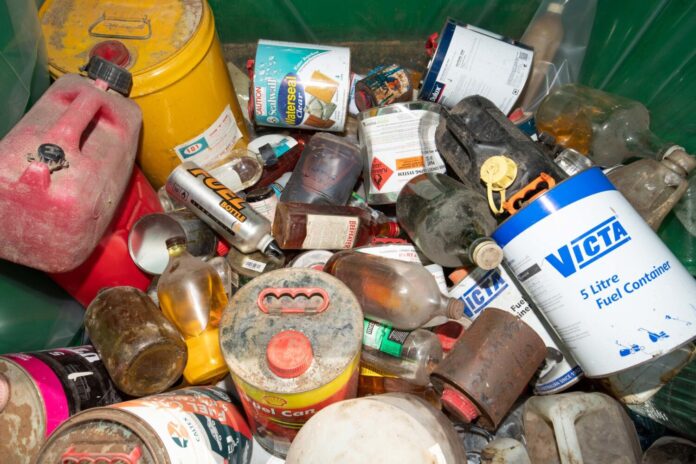Waste management is an important factor often overlooked when undertaking a construction project. Renting a construction dumpster can be a great solution to handle debris efficiently. However, it’s crucial to understand what you can and can’t dispose of in a dumpster rental. Let’s dive into the specifics.
YES: Tile, Flooring, Drywall, or Other Remodeling Debris
A significant amount of waste will inevitably be generated during any remodeling project. This could be in the form of old tiles from a bathroom renovation, pieces of drywall from redoing your basement, or flooring planks from replacing your kitchen floor.
Fortunately, these materials are generally accepted in a construction dumpster rental. They are classified as non-hazardous waste, meaning they don’t contain any substances that could harm the environment or public health. As such, they can be safely disposed of in landfills. However, separating recyclable materials like tiles is always a good way to minimize landfill waste.

YES: Concrete, Dirt, Demolition Debris, Yard Waste
If you’re undertaking a large-scale project like demolishing an old shed or tearing out a concrete patio, you’ll produce a lot of heavy waste. This includes chunks of concrete, piles of dirt, and various demolition debris. These materials are perfect for a construction dumpster rental.
Their substantial size and weight make them challenging to discard through conventional means. Yard debris, including tree limbs, grass trimmings, and bushes, could also be disposed of in a construction waste container. However, it’s advisable to verify with your local ordinances and rental firm, as some regions may impose restrictions on the disposal of organic materials.
YES: Wood, Shingles, Decking
Whether tearing down an old wooden deck or replacing your roof, you’ll end up with a lot of wood and shingles. These materials are generally safe to throw away in a construction dumpster rental. Wood can decompose naturally, and it doesn’t pose any toxic threats.
Commonly, services that manage waste tend to accept asphalt-based roofing materials. Nonetheless, it’s crucial to highlight that chemically-treated wood or non-asphalt shingles might not be deemed suitable for disposal by these services. Always check with your dumpster rental company about their specific policies.
YES: Mattresses, Old Furniture
When cleaning your home or replacing old furniture, you might wonder what to do with items like worn-out mattresses and broken furniture. The good news is these can typically be thrown into a construction dumpster rental.
While bulky and take up a lot of space, they are not considered hazardous waste. However, it’s worth checking with your rental company first, as some may have rules about disposing of larger items. Additionally, consider donation or recycling options for these items to reduce environmental impact.

YES: Pretty Much Any Random Junk
When we talk about random junk, we’re referring to those miscellaneous items that clutter up your home or workspace. These can range from old toys and broken tools to outdated clothes and household items.
Most of these non-hazardous items can be disposed of in a construction dumpster rental. However, it’s always a good idea to recycle whenever possible. Many things, such as old clothing, toys, and even tools, can be donated or recycled instead of being sent to landfill.
NO: Electronics – TVs, Computers, etc.
Electronics, often called e-waste, are generally not allowed in a construction dumpster. This includes televisions, computers, printers, and other electronic devices. This is because they contain potentially harmful materials such as lead, mercury, and cadmium.
These materials can leach into the soil and groundwater if disposed of improperly. Instead, these items should be taken to a designated e-waste recycling facility, where they can be safely dismantled and their components either reused or properly disposed of.
NO: Refrigerators, Tires, Air Conditioners
Construction dumpsters generally do not permit large items like refrigerators, air conditioners, or auto parts like tires. The reason being refrigerators and air conditioners possess refrigerants that could be detrimental to the environment if mishandled.
In contrast, tires can capture methane gas, present a fire hazard in landfill sites, and are typically rejected by city waste facilities due to these associated risks. Contacting local recycling centers or specialty disposal services for these items is best.

NO: Paint Cans, Chemicals, Household Cleaners
Paint cans, chemicals, and household cleaners are classified as hazardous waste. They contain substances that can cause harm to the environment and human health if not disposed of correctly.
For example, paint can contaminate soil and water sources, while certain chemicals can react dangerously with other substances. Therefore, these items should not be thrown into a construction dumpster. Instead, they should be taken to a hazardous waste disposal facility where they can be dealt with safely and appropriately.
NO: Propane Tanks, Adhesives, Medical Waste
Propane tanks, adhesives, and medical waste are all items that should not be disposed of in a construction dumpster rental. Even if empty, propane tanks can still pose a significant risk due to the pressurized gas they contain. They could explode under certain conditions, causing harm to people and property. These should be returned to a propane supplier for safe disposal or recycling.
Adhesives, such as glue and epoxy, are usually classified as hazardous due to their chemical composition. They can release toxic fumes or cause fires if not handled properly. Many waste management companies have specific procedures for disposing of adhesives, so it’s best to check with them or your local waste facility.
Medical waste includes anything from used needles to bandages and other materials that have come into contact with bodily fluids. Improper disposal of these items can lead to the spread of diseases. Disposing medical waste using approved biohazard containers and following local regulations is crucial.
NO: Oil & Gasoline, Contaminated Soil, Asbestos
Potentially harmful substances such as oil and gasoline, polluted soil, and asbestos are strictly prohibited from being discarded in a construction dumpster. Oil and gasoline given their high flammability and potential to pollute the environment, oil, and gasoline should be transported to a local recycling center or facility specializing in hazardous waste.
Soil that has been contaminated, often due to chemical spills or leaks, requires professional treatment and disposal. Asbestos, a harmful substance previously used in construction, requires professional handling due to its health risks. Stop work and contact a professional abatement service if you suspect its presence. Always consult your rental company about their specific policies.

Wrapping It Up: Ensuring Responsible Waste Management With A Construction Dumpster Rental
In conclusion, while a construction dumpster rental can handle a wide variety of waste, it’s important to remember that not everything can be disposed of in such a manner. Always check with your rental company about their specific policies and, when in doubt, opt for proper recycling or specialized disposal methods.









